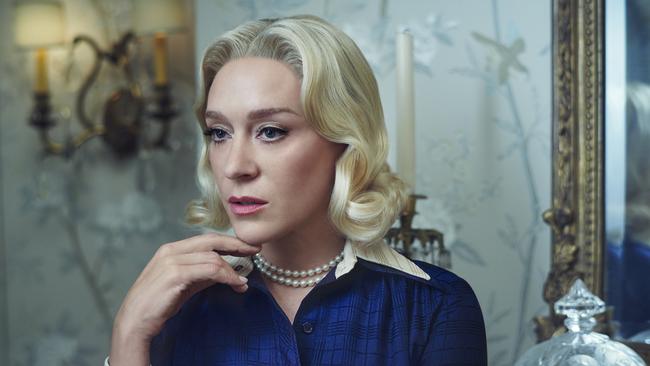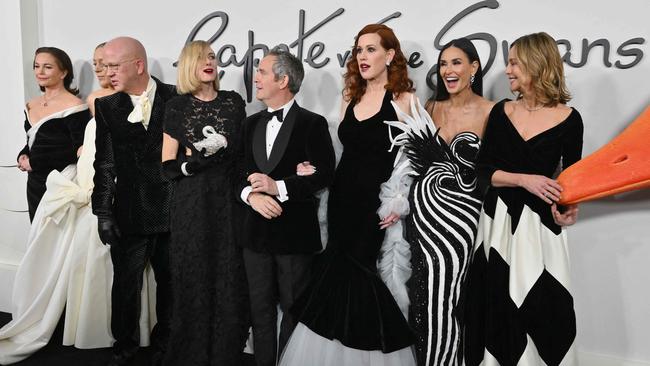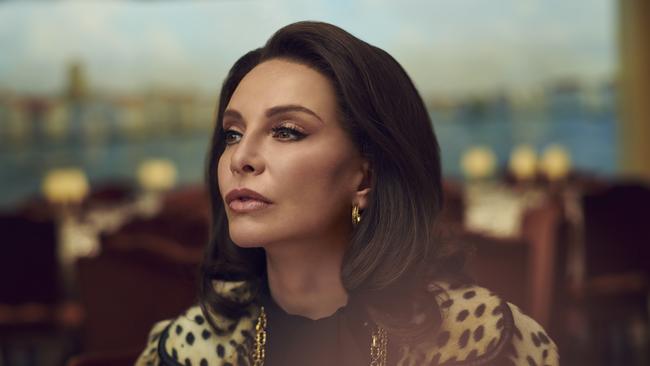High-society feud: Capote vs The Swans is gripping television
Beautifully directed and acted with high intelligence and style, this new Binge series is a must-watch | WATCH THE TRAILER

He’s been called “a Rumpelstiltskin who can spin seemingly offensive concepts into gold” and writer producer Ryan Murphy has an uncanny gift for being able to reinvent TV formats and find massive audiences. Critic Emily Nussbaum says he has in fact up-ended the pieties of modern television. “Like a wild guest at a dinner party he’d lifted the table and slammed it back down, leaving the dishes broken or arranged in a new order.”
He has overseen a dozen television series in the past two decades, including Nip/Tuck, Glee, American Horror Story, American Crime Story, The People v. O.J. Simpson: American Crime Story, Pose, and the glorious Feud: Betty and Joan. This was the devious and quite delicious story of the legendary rivalry between Joan Crawford, played by Jessica Lange, and Susan Sarandon’s Bette Davis, during their collaboration on the black thriller What Ever Happened to Baby Jane? The show explored how the two once seemingly indestructible women endured painful ageism, sexism, and often vicious misogyny – inequities inflicted by the Hollywood studio system and culture that had created them as goddesses.
Now, seven years later, Murphy presents the next chapter in what should be a long-running franchise with Feud: Capote vs. The Swans, his wonderfully colourful tale of the high-society New York women of the 1950s and 60s, including Barbara “Babe” Paley – really with Capote the centre of the series – alongside C.Z. Guest, Slim Keith and Lee Radziwill (Jackie Kennedy’s sister).
They were gorgeous, impeccably groomed, fabulously rich women – also serially adulterous, fond of intersecting love affairs about which they would gossip at lunch – who were befriended, and then betrayed, by Truman Capote, their sinister, and as it turned out predatory, best friend.
Ingratiating himself into their pampered lives, receiving their deepest secrets, he laid it all out in his cutting prose, betraying their deepest confidences, the secrets, the betrayals – even a murder – and then found himself banished forever from high society.
The writer, who saw himself as the Proust of the American social elite, died just shy of age 60, demonised by addictions to alcohol and drugs, savaged by rejection, his death the result really of a kind of social suicide. (“All literature is gossip,” Capote told Playboy magazine after the controversy erupted. “What in God’s green earth is Anna Karenina or War and Peace or

Madame Bovary, if not gossip?”)
The series is written by two-time Pulitzer Prize finalist Jon Robin Baitz, taking its inspiration from Laurence Leamer’s bestseller Capote’s Women: A True Story of Love, Betrayal and a Swan Song for an Era. A book that received poor reviews, the Guardian describing the author as “a woeful stylist, who relies on trashy adjectives such as ‘upscale’ and ‘humongous’, confuses ‘cachet’ with ‘cache’, ridicules Bostonians who ‘effect’ British accents, and thinks that an aristocratic crone Capote called Lady Ina Coolbirth must be ‘royal’ ”.
But Murphy and Baitz saw a series in it. “It was a story about ambition, friendship, and writer’s block,” Murphy says. “It was a story about how you top yourself, and whether you even can. And it was, at its core, a story about relationships between men and women, specifically gay men and their girlfriends. A feud is never about hatred; a feud is about pain, always. For the show to work, there had to be a great split that was about heartache as opposed to hatred, and Babe and Truman were at the centre of that.”
Baitz says he saw the book as a multifaceted examination of what it is to squander your life inadvertently but self-destructively on so many different levels. “I found it to be a cautionary tale and an accurate representation of what can happen when you’re not listening to yourself. Your life becomes about your name on the invitation to the gala, your collections, you’re standing in a society where you are within a system. The show very much is, for me, about the profound loneliness of beauty and fame.”
Palme d’Or-winning Gus Van Sant, who was also Oscar-nominated for Good Will Hunting and Milk, directs, with The White Lotus’s Tom Hollander playing Capote, one of history’s wittiest gay men. And he does it with great skill, getting that distinctive high-pitched voice just right, a querulous squeak really. Gore Vidal said it could only be understood by dogs. Naomi Watts is Barbara “Babe” Paley (wife of CBS founder William S Paley, played by Treat Williams), a beautifully withheld performance, Diane Lane is Slim Keith, Chloë Sevigny is C.Z. Guest and Calista Flockhart is Lee Radziwill. The series also stars Demi Moore as Ann “Bang-Bang” Woodward, and Molly Ringwald as Joanne Carson (Johnny Carson’s second wife), a close friend of the writer.

They inhabited a bright and beckoning world, too. “The 1960s, a decade often defined by images of Jackie Kennedy’s sunglasses, James Bond’s martinis,” wrote Deborah Davis, author of Party of the Century: The Fabulous Story of Truman Capote and his Black and White Ball, the huge, formal party the writer hosted at New York’s Plaza Hotel. “Andy Warhol’s soup cans, and Mary Quant’s miniskirt, were a time of high style and high expectations. Life seemed more glamorous then – sex was sexier, success more attainable. Even the moon, as the space program promised, was within reach for the very first time.”
But, as the split with Capote dramatises so vividly in the series, the world of the Swans is changing, too, the culture they represent – something Murphy says he grew up idolising – splitting and starting to atrophy. As Baitz says “this story exists at this point where a world of elegance, ritual, and class is being supplanted by a fervour of youth: disco, Studio 54, drugs, and all. What had been interesting and glamorous was no longer and we both felt the poignancy of that.”
Capote explains in the first episode why he characterises these wealthy kept women as his Swans. “They are beautiful and unruffled above the water, stunning, singular, gliding through the ponds of society, but God gave them too much baggage, you see. Underneath the crisp surface of the water they have to paddle as vigorously as an ordinary duck just to stay afloat.”
And as Murphy and his collaborators reveal, often cruelly but with great wit, they paddled in a pond of great privilege and luxury, none of them possessed of the capacity to exist outside of it. Baitz says that as creators he and Murphy were consumed with the moments when change began to happen around these women.
“The other thing we obsessed about were those moments when a culture splits, and this story exists at this point where a world of elegance, ritual, and class is being supplanted by a fervour of youth: disco, Studio 54, drugs, and all. What had been interesting and glamorous was no longer, and we both felt the poignancy of that.”
The first episode moves quickly and soon cuts to the chase with Capote’s duplicity. We see him watching swans in a park at the start, maybe a plot forming in his mind, and then quickly observe him moving in on Paley, “the most beautiful woman ever made” insinuating himself into her life. “The only person who could really hurt me is you,” she tells him, as he feeds her drugs and whiskey. “You’re a terrible influence,” she giggles. Then “the Tiny Terror” becomes part of the lives of her wealthy friends, electrifying their days and nights, their ultimate trophy: the boy genius whose masterpiece, “In Cold Blood,” made him a national celebrity,
There are flashbacks to drug taking, infidelities – one extraordinary scene of menstruation-driven revenge sex – “the sheets bloodied with stains the size of Brazil,” Capote would write – and even murder, Capote revelling in it all, already writing chapters in his head for what he considers will be his masterpiece, a Roman à clef called Answered Prayers. This he believed would “do to America what Proust did for France.” (It was said to be named for a quote attributed (possibly apocryphally) to Saint Teresa of Avila: “More tears are shed over answered prayers than unanswered ones.”)
But by 1975 he’s a drunk and owes his publisher Random House more than $400,000 for the unfinished manuscript, but the lunches at fashionable restaurant La Cote Basque continue with gossiping socialites and oversized plates garnished with towering timbales and puff pastry sculptures. But his version of one lunch called La Cote Basque, published in Esquire in 1976, ends everything for him and we are left with a group of furious women determined to fight back. “What did they expect?” he would say. “I’m a writer.”
It’s beautifully directed and acted with high intelligence and style. Hollander’s performance hardly celebrates a gay icon; his Capote is not just witty and often jolly with eccentric moments of physical theatre, but cold and manipulative, his motivations heartlessly selfish, the man a mean little drunk. When Unspoiled Monsters, the first chapter of Answered Prayers appeared, Capote posed for the cover as an assassin, holding a stiletto.
Feud: Capote vs. the Swans, streaming on Binge from Thursday, two-episode premiere.


To join the conversation, please log in. Don't have an account? Register
Join the conversation, you are commenting as Logout